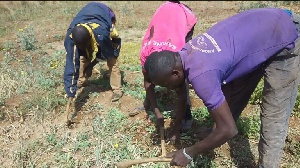 The harmattan has forced the farmers to harvest their crops prematurely
The harmattan has forced the farmers to harvest their crops prematurely
Hundreds of irrigation farmers in the Bawku West District of the Upper East region say thay have lost millions of cedis to poor harvest occasioned by no availability of water to feed their crops.
They farmers, who cultivate crops and vegetables at the Goo Dam site in Teshie area of the district, the harmattan has caused the dam to dry up.
As a result, they the said they have been struggling in getting water to irrigate their vegetable farms in the area, a situation that has forced most farmers to begin harvesting their crops, which are not matured.
According to the farmers who have for the past week been counting their losses, they were surprised that improved seeds obtained from the agric office still have with no yields.
They claimed improved onion seeds which were planted a month before planting their local variety, were yet to mature while the local ones had matured.
The improved variety crops, they said, could not withstand the vargaries of the weather as they are drying up due to lack of water to irrigate the farm.
One irrigation farmer, Aberintoa Abanga told 3news.com that more than 500 farmers were involved in irrigation farming at the site have been affected by the situation, which is the result of the harmattan.
Abarintoa put the estimated cost of loss to farmers around million of cedis.
He observed the dam provided employment to no fewer than 1,500 people, especially youths, who worked directly as farm hands as well as those engaged in trading at the dam premises.
Gideon Mbawin said about 100 hectares of land were cultivated, noting crops being produced included tomato, cabbage, okro, maize, onion and other vegetables in large quantities.
He revealed that the Goo dam, which was constructed many years ago, had only been dredged once.
He thus called on government to include the dam in its dredging projects or under the one village one dam project for it to store more water, as the rainy season would begin soon.
Another farmer, Apodbilla Agambilla described the dam as a major source of employment to people in the area, called for an urgent dredging of the dam to create opportunities to many more the unemployed people.
He said tomato farmers harvested between 300 and 350 baskets per hectare and based on the present prices of GHC30 per basket, a huge amount of money had been lost.
According to him, farmers cultivating crops such as maize, cabbages and tubers will suffer low harvest because of the seizure of water supply.
He added that people from towns and villages in Zebilla, Soogo, Googo, Agatusi and other neighbouring areas, are engaged in farming or conducted various businesses at the dam sites for their livelihoods.
Another farmer, called on the government to ensure that the dam is dredged for the benefit of the people.
A fisherman also said his business had suffered as a result of the dry-up of the dam, and that many more have been affected as no fewer than 60 people conduct their businesses at the dam daily.
Abanga David a farmer who is into livestock’s farming, also called on government through the Ministry of Agriculture to dredge the dam to prevent future occurrences.
Mr. David put the blame on the doorsteps of farmers around the dam.
“They farm around the dam and the sand is washed by rain into the dam making it full and in the raining season you will see the dam full but its not actually deep,” he said.
He fears their animals will die as a result of the drying up of the dam, as there will be no water to keep them alive.